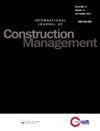Multimode variable resource-constrained time/cost trade-off problem in repetitive projects with adjustment strategy
IF 3.4
Q2 CONSTRUCTION & BUILDING TECHNOLOGY
International Journal of Construction Management
Pub Date : 2023-11-03
DOI:10.1080/15623599.2023.2276650
引用次数: 0
Abstract
AbstractResource availability is the crucial factor of construction project scheduling decision, as it impacts the time and cost of the project. However, traditional researches assume that resource availability is fixed, which does not reflect the actual situation. This article proposes a model for addressing the multimode variable resource-constrained time/cost trade-off problem (Mvrc-DTCTP) in repetitive projects. To better capture the characteristics of repetitive projects, an adjustment strategy is designed to mitigate the impact of work continuity interruptions on idle time. Through simulation analysis, it was found that increasing resource supply can reduce project duration, but it is not directly proportional to cost. This phenomenon further increases the uncertainty in the relationship between duration and cost, inevitably affecting managers’ ability to develop effective scheduling plans. By employing the Mvrc-DTCTP model, project managers can obtain more and better solutions than traditional methods, with shorter duration, and lower total cost. The proposed adjustment strategy results in a 54% reduction in idle time, a $4000 cost reduction and more feasible solutions. Based on calculations for 30 randomly generated cases, the adjustment strategy achieves optimization rates ranging from 24.43% to 84.24%. The adjustment strategy demonstrates the best optimization effect when the resource supply level is moderate.Keywords: Variable resource supplywork continuitydiscrete time/cost trade-offrepetitive projectmultimode resource-constrained Disclosure statementNo potential conflict of interest was reported by the authors.Data availability statementData available within the article or its supplementary materials.具有调整策略的重复项目中多模式可变资源约束时间/成本权衡问题
摘要资源可获得性是建设项目进度决策的关键因素,它影响着项目的时间和成本。然而,传统研究假设资源可用性是固定的,这与实际情况不符。本文提出了一个解决重复项目中多模式可变资源约束时间/成本权衡问题(Mvrc-DTCTP)的模型。为了更好地捕捉重复性项目的特征,设计了一种调整策略,以减轻工作连续性中断对空闲时间的影响。通过仿真分析发现,增加资源供给可以缩短项目工期,但与成本不成正比。这种现象进一步增加了工期与成本关系的不确定性,不可避免地影响管理者制定有效调度计划的能力。采用Mvrc-DTCTP模型,项目经理可以获得比传统方法更多更好的解决方案,工期更短,总成本更低。提出的调整策略使闲置时间减少了54%,成本降低了4000美元,并提供了更可行的解决方案。通过对30个随机生成案例的计算,调整策略的优化率在24.43% ~ 84.24%之间。当资源供给水平适中时,调整策略的优化效果最佳。关键词:可变资源供给工作连续性离散时间/成本权衡重复项目多模式资源约束披露声明作者未报告潜在的利益冲突。数据可用性声明文章或其补充材料中可用的数据。
本文章由计算机程序翻译,如有差异,请以英文原文为准。
求助全文
约1分钟内获得全文
求助全文
来源期刊

International Journal of Construction Management
MANAGEMENT-
CiteScore
8.60
自引率
17.90%
发文量
112
期刊介绍:
The International Journal of Construction Management publishes quality papers aiming to advance the knowledge of construction management. The Journal is devoted to the publication of original research including, but not limited to the following: Sustainable Construction (Green building; Carbon emission; Waste management; Energy saving) Construction life cycle management Construction informatics (Building information modelling; Information communication technology; Virtual design and construction) Smart construction (Robotics; Artificial intelligence; 3D printing) Big data for construction Legal issues in construction Public policies for construction Building and Infrastructures Health, safety and well-being in construction Risk management in construction Disaster management and resilience Construction procurement Construction management education
 求助内容:
求助内容: 应助结果提醒方式:
应助结果提醒方式:


